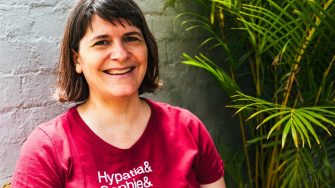Mathematician Catherine Greenhill elected as a 2022 Fellow of the Australian Academy of Science
She joins a group of distinguished scientists, recognised for their groundbreaking research.
She joins a group of distinguished scientists, recognised for their groundbreaking research.

We are delighted to announce that Professor Catherine Greenhill of the School of Mathematics and Statistics has been elected as a Fellow of the Australian Academy of Science.
Professor Greenhill is among 22 outstanding researchers from across the breadth of Australian science who have been recognised in this year’s Fellowships.
Fellows of the Australian Academy of Science are among the country’s most distinguished scientists, elected by their peers for groundbreaking research and contributions that have had clear impact.
Internationally recognised as a leading expert in asymptotic, probabilistic and algorithmic combinatorics, Professor Greenhill undertakes research at the interface between combinatorics, probability and theoretical computer science.
She tackles difficult, fundamental questions about ubiquitous combinatorial objects, such as graphs and hypergraphs. She has achieved major breakthroughs including establishing the efficiency of a natural algorithm for generating graphs, and finding threshold values for the emergence of certain structures in random hypergraphs.
“My research defines families or ensembles of graphs which are alike in some way, by specifying the number of connections involving each object in the system”, Professor Greenhill said. “I aim to prove results about the typical properties of members of this family, find good estimates for the number of graphs in the family or provide efficient algorithms for generating a random element of the family”.
While she’s interested in these questions for their own sake, her highly cited research provides new formulae and algorithms with broad applications in many areas, including cryptography and physics. It also provides tools which can be useful to researchers using graphs or hypergraphs to model real-world discrete systems.
Catherine Greenhill joined the School of Mathematics and Statistics at UNSW in 2003. A member of the Combinatorics research group, she has also been heavily involved in the School’s flagship annual outreach event, Girls Do the Maths, since its inception. Professor Greenhill is the current Chair of the Women in Mathematics Special Interest Group (WIMSIG) of the Australian Mathematical Society. She was promoted to Professor at UNSW in 2019.
In 2015, she won the Australian Academy of Science Christopher Heyde Medal in Pure Mathematics, and was awarded the Institute of Combinatorics and its Applications Hall Medal in 2010.
“It is a great honour to be elected as a Fellow of the Australian Academy of Science”, said Professor Greenhill. “Almost all of my research is performed in collaboration, so I would like to acknowledge my wonderful co-authors, ranging from senior colleagues through to talented undergraduate students. I have learnt so much from working with all of you”.
2022 is the first time in the Academy’s history that gender parity has been achieved in the annual election of new Fellows, with this year’s cohort comprising 50% women and 50% men.
“I am very proud to join the growing number of women Fellows in mathematics and statistics”, Professor Greenhill said. “There is a mathematical "family" connection between me and the other women in Pure Mathematics who have been elected as Fellows to the Academy. The first was Hanna Neumann, the mother of my supervisor Peter Neumann, and the second was Cheryl Praeger, my "mathematical sister" who was also supervised by Peter Neumann”.
This year’s Fellows include former UNSW Dean of Science, Professor Emma Johnston. Professor Greenhill joins several colleagues in UNSW Mathematics and Statistics who are Fellows of the Academy, including Michael Cowling, Gary Froyland, Trevor McDougall, Colin Rogers, Igor Shparlinski, Ian Sloan and Fedor Sukochev.
The 2022 Fellows will present their work and achievements at Science at the Shine Dome in Canberra on 23 November. This is an annual Academy event where Australia’s most influential scientists gather to celebrate science and to honour outstanding achievements in science.
We warmly congratulate Professor Catherine Greenhill for this wonderful and well-deserved recognition of her outstanding research achievements.